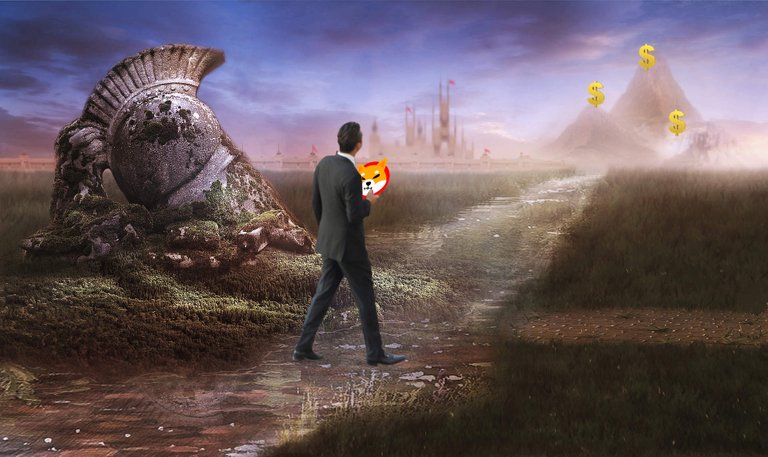
Okay, so I’ve been a big fan of DUE DILIGENCE since I began in the crypto space. It’s the only way to determine the health and strength of a crypto project, many of which have been fly by night in their approach and end up stealing your money. There’s a lot of projects out there , and a lot of brand spanking new speculators always willing to have their money stolen because they’re naïve.
I’m one of them, folks. LibertyOS ate my shit and I hate that I did it. Another confession: I sold my position in BitTorrent token to buy into LibertyOS. That cost me 40,000 dollars, guys. Big retarded mistake on my part.

Even big, opinionated assholes like me fall victim to the hype.
So, in the name experience, I’m gonna give you an updated list of things you should do in to minimize your risk. This isn’t Financial advice, DYOR (Do Your Own Research) is the name of the game. I’m just gonna tell you how to DYOR.
1. WHAT IS THE CRYPTO?
Before you even think of hitting the exchanges, you need to know what the crypto is, how it is used, and what is the roadmap for the future. Some of the things you can ask is:
1.) Does this crypto tokenize on an existing blockchain or does it have its own? This is really important. Take SHIB, for example. I know that it uses the Ethereum blockchain. I know that ETH is among the most popular cryptos for tokenizing, with ERC-20 being the most common. This could be good, and could be bad. For example, I can tell if they’re legitimate because I can search the Ethereum blockchain for their token and confirm that it has other holders.
While being on its own blockchain can be a good thing (think Cardano, for example), it can be a risk if they do not have a means of tracking transactions on their ledger. They could simply be telling you they have a blockchain, but if you can’t prove it, they might as well not have one at all.
2.) What Kind of Protocol Are They Using? Know your basic types of protocols used in crypto projects such as PoW (Proof of Work, like Bitcoin), PoS (Proof of Stake, like Tezos), and so on. Some might have some brand new or very unique forms of protocol, such as “Proof of Space” like Chia, which uses your hard drive space for validating and confirming transactions. There are all kinds of protocols out there. Read carefully and know how they work.
3.) What is Their Use Case Here? You should want to know from square one what exactly the crypto provider wants to do with their asset, and how they expect to compete with rivals already established in the industry. Is it based on some new technology? Do they want to do decentralized finance? What exactly is their aim? If you cannot figure that out by reading their whitepaper or website description, you might be dealing with something a bit sketchy.
4.) When was The Coin/Company founded? In the traditional business world, it is said that the average company is likely to fail within two years. That’s just the name of the game. How long has this company been around? This will give you a huge indicator of their ability to keep the project going and that at the very least, they have enough of a substantial project to survive in this space.
5.) What is the Economic Health of Their Coin? There is a plethora of factors that demonstrate the success of a coin. Unless you’re getting in on the ground floor of the project, you will likely see 24-hour volume that indicates usage, trading and activity on exchanges. You’ll also want to know how widely a coin is being traded. How many exchanges are they listed, and what coins do they pair with on them? What is their total supply and if it is large, do they have any mechanisms of burning to reduce supply? How does the demand look? That last one is very much related to their online presence and reputability among the market. For a quick glance, you can look at the health of nearly any coin with some sort of tracker website, like CoinGecko.
6.) What Do They Offer Me as an Investor? This is a big one. You’ll commonly see a lot of high APR offers for staking for many different coins and services, but you’ll want to figure out WHY it is so high, and what kind of risks are associated with putting money into it. For example, if you have a coin claiming it can give you 100% APR, it’s basically saying it can double your money every year. I would be highly doubtful of such a claim. If it’s something reasonable like 4%, then it makes more sense that their ecosystem is sustainable. This is especially important because the space is rife with Ponzi Schemes.
2. THE FOLKS BEHIND THE CURTAIN.
Just as you can know a crypto, you can also figure out the names behind it, and how they interact with the community they’re creating around their project.
1.) Who are the Big Players in This Crypto? You want to know the names and previous work of the major players of the project, because this can tell you what their rate of success is, or if they have a reputation for bringing people into a project and then jumping ship. You can see this with all kinds of traditional companies or foundations, especially with the ones associated with space industry. Some of these guys have been doing these kind of vaporware projects for years and raking in the profits without providing any sort of return for the investors.
2.) What are Their Social Media Outlets? Companies in the traditional world now leverage social media to a large degree, and us it as a touch point between the company and the people interested in their project. It’s pretty common for them to have official channels on Twitter, Facebook, Telegram and hell, HERE! Banano is a great example of this. Other places like read.cash and LBRY can be places where they interact with their followers and provide updates and such for their project. Hell, I’d even respect TikTok or Instagram if they had it. In addition to having several outlets, it is important that they are ACTIVE on their social spaces.
If you cannot contact their folks via their social media, or if they haven’t so much as tweeted or released a video in a year, you can bet your bottom dollar they are sketchy. A company with a desire to grow and legitimize itself will NOT ignore social media outlets. It is among the best sources of advertising in the Information Age. Businesses with a good sense know this and will do everything they can to maintain their outlets regularly.
3. WHAT ABOUT YOU?
1.) Do Your Ideals and Such Match With the Companies? Now, this is not necessarily an indicator of health, but it has to do with YOU, the investor. Do you believe what they are doing is something good? Do you like their Community? As an investor, it does behoove you to participate with the community around the project as much as possible. This will assist you in getting insight into how others feel about it and can give you indications of newest developments in the project as they come around.
2.) Can You Afford to Invest in This Project? If you were to invest in this project, would you be able to only invest that which you can afford to lose? There are no guarantees in life, but if you have made it to this point, you might feel confident enough to throw some money at it. Take a good look at your finances and see if you can do without say, X amount of dollars. If you can and you’re comfortable, go for it. Otherwise, you might need to wait. Don’t get FOMO and run into something headfirst. I have done this before, and it didn’t end well for me.
THE FINAL WORD
Investing in the Crypto world is not for the faint of heart. It’s a relatively new asset class. Where things will go in the future, despite great growth in the industry is still questionable. Upcoming legislation may do any number of unprecedented things for crypto investors, depending on where you are in the world. Many professionals would say if you must invest in Crypto, try keeping it about 10 percent of your whole portfolio. It provides a little volatility, and can be your “play” space. That’s kinda what I do, and I don’t think it hurts to speculate just a little in the name of potential gains.
But that’s about it, I’m looking forward to hearing more about what you think and what you would add to my list of Due Diligence tips. Super awesome.
Keep your eye on them there markets! Thars gold in ‘em someplace.
As much as I would love to invest in crypto, it seems so complicated and I don't want to lose money(i know eventually I would have to)
Ah, you dont necessarily need to! Trust me, i understand not wanting to lose money, crypto volatility is real and is mostly a speculative investment at this point.
Look at it this way, by participating in Hive, you are indeed investing some time into crypto. It's a little bit of "sweat equity" in return for some HP/HBD.
I guess I need to start somewhere